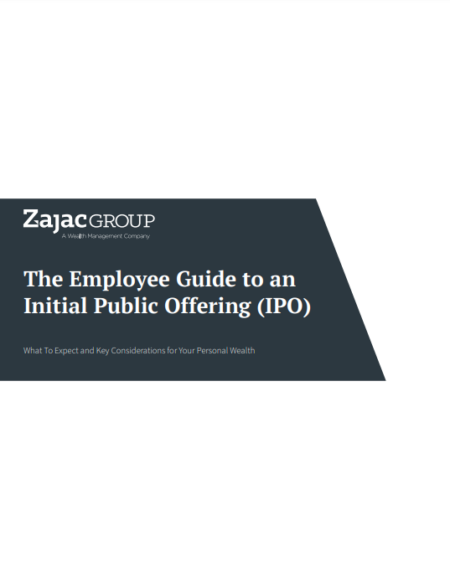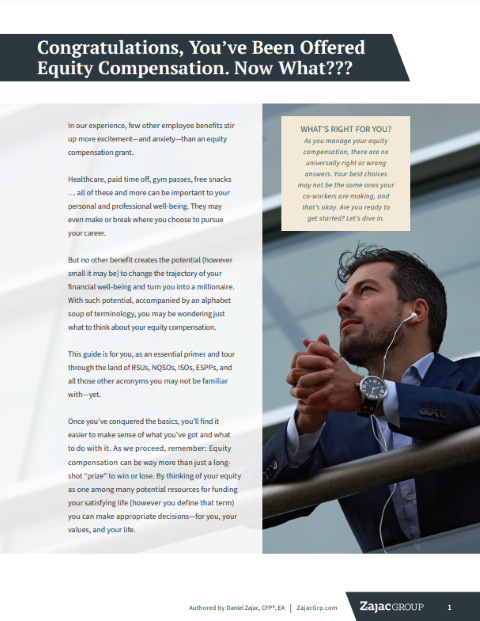
Being taxed when you exercise non-qualified stock options, or NQSOs, is attractive for a few reasons. For one, you control when your options become taxable. You may also enjoy more clarity as to what options are being exercised and what the value of those options will be. This means you can better estimate the tax impact you’ll face when you exercise (which is helpful for planning purposes).
Another benefit to non-qualified stock options is the ability to sell exercised shares immediately via a cashless exercise. If you go this route, you turn the value of the stock options into actual cash you can use.
Finally, you also have the potential to use an 83(b) election with NQSOs. Here’s what you need to know about this option and why you might want to consider it.
Understanding 83(b) Elections for Non-Qualified Stock Options
The first thing you’ll want to do is confirm whether or not you have the ability to do an early exercise of your non-qualified stock options. You can likely check your company plan document to confirm whether this is available to you. If you do, you want to consider an 83(b) election.
If allowed an early exercise, the 83(b) election of non-qualified stock options allows you to exercise and pay tax on your pre-vested NQSOs. When you exercise your NQSO, you’re taxed on the spread between the exercise price of the NQSO and the price at exercise at that time. Since the shares are pre-vested, it’s possible that the spread between these two figures is smaller than it will be later.
Free Guide to IPOs
If you’re an executive, director, or other critical employee whose company is in the throes of an initial public offering (IPO), you’ll want to read this.
Download Now
The goal of using an 83(b) election is to turn what may be future price appreciation that would normally be taxed at ordinary income tax rates into a long-term capital gain. Using a simple assumption for tax rates, this could mean transferring income that might otherwise be taxed at 33% and, through the election, getting a better rate of 20%.
Of course, you need to discuss your specific situation with your accountant to evaluate the exact tax rates under each condition to determine if an 83(b) election would make sense for you or not. But in the meantime, we can get a better idea of whether an 83(b) election is something to consider by taking some time to look more at the normal taxation of NQSOs.
How a Non-Qualified Stock Option Is Normally Taxed
If you have non-qualified stock options, you will generally pay ordinary income tax on the difference between the fair market value of the stock at exercise and your exercise price, multiplied by the number of options exercised. (This is commonly referred to as the bargain element.)
The bargain element generally appears on your W-2 (for employees) in the year of exercise and is subject to Social Security and Medicare wage taxes. This amount is taxable whether or not you hold the shares post-exercise or if you sell some or all of your shares right away.
The fair market value when you exercise helps establish your cost basis in the stock. Your cost basis is what you paid for the stock, and future gain or loss calculated from the cost basis will be subject to the rules for capital gains tax.
If the stock is held for one year or less and then sold, gain or loss from the cost basis at exercise will be a short-term capital gain or loss. If the stock is held for longer than one year, the gain (if any) will be subject to potentially preferential long-term capital gains treatment.
Using an example to illustrate, let’s assume we have the following scenario:
- 10,000 NQSOs
- Exercise Price: $1.00
- Share Price at Vest: $30
- Share Price at Exercise: $50
- Final Sale Price: $50
Generally speaking, you do not owe taxes when your non-qualified stock options are granted and you do not owe tax when they vest. Even though you don’t have to pay taxes yet, you may have NQSOs with considerable value.
The value of the options when the shares vest in this example is equal to the following:
(Fair Market Value at Vest – Exercise Price) * Number of Shares Exercised
($30 – $1) * 10,000 = $290,000
By continuing to hold the shares after they vest, you bypass the opportunity to “cash in” on this potential profit via an exercise and sell (but you also don’t have to pay any taxes yet).
Eventually, assuming the options are in the money, you will likely exercise your options, realize the value, and potentially capture a profit. When you do exercise, you’ll create a reportable tax event and possibly owe tax. In our example, the taxable income is equal to:
(Fair Market Value at Exercise – Exercise Price) * Number of Shares Exercised
($50 – $1) * 10,000 = $490,000
Usually, deferring taxes is a good thing — but if you hold an appreciating stock, waiting to exercise non-qualified stock options likely means paying more in tax than had you exercised the shares early and held them.
Going back to our example above, if we assume a flat 33% tax rate on ordinary income, we can calculate the total tax due in this transaction as $490,000 x 33%, or $161,700.
How an 83(b) Election May Impact Tax on Non-Qualified Stock Options
Because of the potential tax liability associated with an exercise of a non-qualified stock option connected to an appreciating stock, it’s not uncommon to wonder how you may be able to minimize the pending tax bill. That brings us back to the 83(b) election.
As previously stated, non-qualified stock options are typically taxable in the year you exercise them. This means that during the time between when the shares are granted, when they vest, and immediately prior to when they are exercised, no tax is due.
With an 83(b) election, you may choose to exercise your non-qualified stock options and pay income taxes prior to the option vesting, in what is commonly referred to as an early-exercise. One reason to choose this route is that you hope for the spread between the exercise price and the fair market value to be lower now than it will be later.
Following the example from above, let’s assume you early exercise and file an 83(b). Let’s further assume the following scenario:
- 10,000 NQSOS
- Exercise Price: $1.00
- Share Price at Early Exercise with 83(b): $2.00
- Share Price at Vest: $30
- Final Sale Price: $50
Assuming you exercise your options, elect 83(b), and file the requisite documents, you will be taxed on the spread at exercise. The spread, or bargain element, is equal to:
(Fair Market Value at Exercise – Exercise Price) * Number of Shares Exercised
($2 – $1) * 10,000 = $10,000
In this example, you report $10,000 of ordinary income in the year of exercise. When the shares are sold in a final sale, $480,000 will be taxed as a capital gain. Assuming long term capital gain rates of 20%, the total tax due will be $480,000 x 20% = $96,000.
If we compare not taking an 83(b) election and making an 83(b) election in our two examples, no 83(b) election leads to a tax bill of $161,700 and an 83(b) election leads to $96,000 in taxes.
The Risks of an 83(b) Election
That doesn’t mean an 83(b) election will always work out in your favor this way. The idea of paying fewer taxes is nice, but using the election is not without risks.
When you exercise early using an 83(b) election, you buy shares of stock that haven’t vested, and that you do not currently own or have rights to. To obtain those rights, you need to meet the requisite vesting schedule and/or requirements.
If you leave the company before the shares vest, it means you paid for something that you never received. To make matters potentially worse, it’s possible that if you had paid tax on the bargain element when you exercised, you may have also paid more in taxes than you otherwise would have needed to.
You also assume the risk that the stock price does not increase in value. An 83(b) election can be a great tool if the stock appreciates, but there is certainly no guarantee of this happening.
If the stock price goes down after you exercise the option, you may find yourself having paid more in taxes than had you not exercised early, or find yourself paying for the shares at a higher price than what you otherwise would have needed to. Either way, you face a potential loss.
Determining Whether to Take an 83(b) Election with Your Non-Qualified Stock Options
An 83(b) election may be an option if you are granted non-qualified stock options. The chance to pay a lower capital gains tax rate as compared to ordinary income may make an 83(b) election worth exploring.
But it’s not a risk-free proposition. You may find yourself paying more in taxes or more for the stock should the stock price not go up in value, or should you leave your company prior to receiving your stock.
Just like any other financial planning decision you make in regards to your equity compensation and employee stock options, an 83(b) election for NQSOs should be evaluated as part of a larger plan. That plan should not only evaluate the tax impact of your decision, but evaluates your overall goals, objectives, cash flows, and long-term financial plan to help determine the best path forward.
This material is intended for informational/educational purposes only and should not be construed as investment, tax, or legal advice, a solicitation, or a recommendation to buy or sell any security or investment product. Hypothetical examples contained herein are for illustrative purposes only and do not reflect, nor attempt to predict, the actual results of any investment. The information contained herein is taken from sources believed to be reliable, however, accuracy or completeness cannot be guaranteed. Please contact your financial, tax, and legal professionals for more information specific to your situation. Investments are subject to risk, including the loss of principal. Because investment return and principal value fluctuate, shares may be worth more or less than their original value. Some investments are not suitable for all investors, and there is no guarantee that any investing goal will be met. Past performance is no guarantee of future results. Talk to your financial advisor before making any investing decisions.







Thank you for your article. In your hypo analyzing effect of 83(b) election for NQSO you assume 0 income from the election since share price @ exercise w 83(b) is the same as $1 exercise price. Isn’t the comparison to be made using not the share price but the FMV of the NQSO. If typical NQSO can exercise ratably over 4 years, FMV of NQSO would almost certainly be higher than $1 share price and therefore income would be reportable on election. Comments? Thank you.
Well written. Thanks. We are in process of making a key hire and the candidate wants to purchase all of his options upfront (prior to vesting) with a provision that the company has right to buy back unvested shares should he leave early for any reason.
You likely should get paid for answering above. Grin. Our lawyer will be in our BOD meeting today when we will make the call on the financial package for the offer.